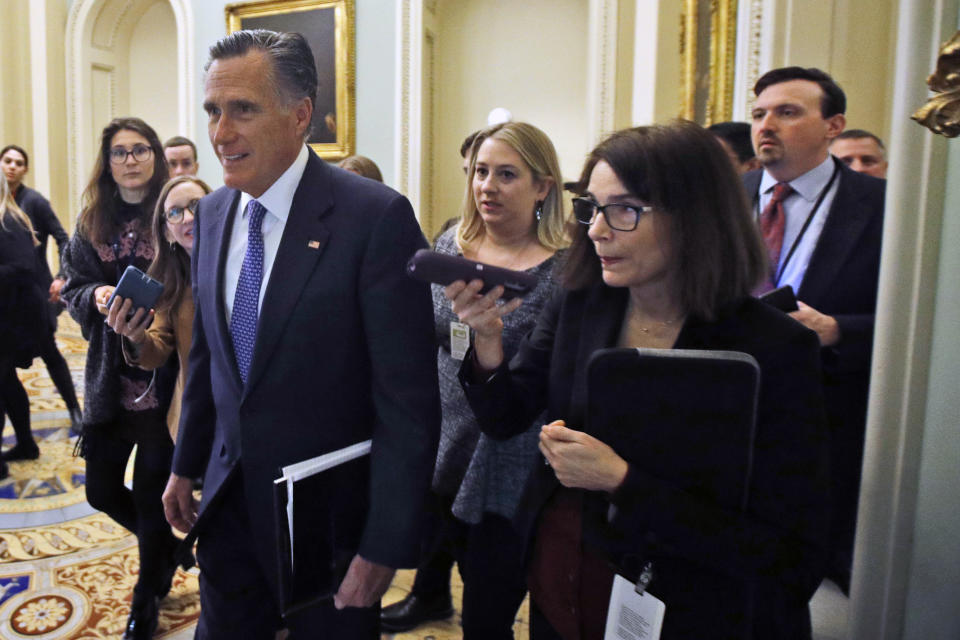The economy saved Trump from impeachment
He has certain skills, but President Trump also benefits from lucky timing. And his impeachment trial fell at an ideal time on the economic calendar.
The Senate will almost certainly acquit Trump this week—ending the impeachment drama—as the unemployment rate is at a 50-year low and the stock market is close to record highs. The economy itself is (probably) in the late stages of the longest business-cycle expansion on record. Consumers feel upbeat and don’t have to worry about what is normally their No. 1 concern: jobs and the economy.
Trump’s party-line acquittal will occur because his approval rating, which is in the low 40s among all voters, is nearly 90% in the Republican party. Roughly the same portion of Republicans say they approve of Trump’s handling of the economy, according to Morning Consult. Only 21% of Democrats and 47% of Independents feel the same way. So views on the economy essentially unify Republicans in their support of Trump.
It’s possible some Republican senators will vote to acquit Trump because they genuinely believe his transgressions regarding Ukraine were not impeachable. Okay, done laughing? Now for reality: Senate Republicans can’t buck Trump because he’s notoriously vindictive and would try to end their political careers. And his near-unanimous support in the Republican party might allow him to do it.
Trump’s approval in the party would be lower—perhaps far lower—if the economy were weaker or a recession hit. Analysis of Trump voters in surveys such as the Democracy Fund’s Voter Study Group shows that some Trump supporters would truly back him no matter what, for cultural reasons not pertaining to the economy. But maybe two-fifths of Trump’s support comes from voters who feel things are fine, so why risk messing anything up? Some of those voters don’t even like Trump, but they feel his tax cuts and deregulatory efforts have been an economic boon.
The economy under Nixon, Clinton
Richard Nixon didn’t have the fortune of a solid economy behind him when he resigned in August 1974. The economy back then had actually entered a recession, with GDP falling from a 7.6% annual growth rate at the start of 1973 to -0.6% in the third quarter of 1974. The unemployment rate during the same period rose from 4.9% to 5.5%, and was on its way to getting much worse. Inflation had crested 10%. Consumers were jittery, for good reason.

Nixon’s approval rating plummeted as the economy weakened. By the time he left office, it had plunged from a high of 67% to a dismal 24%, the lowest of his presidency. The unfolding Watergate scandal undoubtedly helped knock Nixon down, but, as with Trump, voters had mixed views on the matter. Polls by Gallup, Harris and others showed that nearly half of voters felt the Watergate scandal was overblown. Nixon’s overall approval rating was far lower than the portion of voters who felt he should resign, largely because the economy was turning lousy.
Nixon resisted calls to resign and only quit when political allies told him he had lost Republican support on Capitol Hill, and the Senate would likely convict him. With a historically low approval rating, that’s not surprising. Republicans could buck Nixon without risking much blowback from the president’s dwindling base of support.
When Bill Clinton faced an impeachment vote in 1999, the economy was much more like Trump’s than Nixon’s. An economic boom was in its eighth year. Real GDP growth was a robust 4.8%. The unemployment rate was 4.4% and there was no inflation to speak of. Clinton’s approval rating had dipped during the impeachment process, but was still around 60% when the Senate voted to acquit him in February 1999.
There were intangibles in each impeachment scenario, and the economy was hardly the only factor in each outcome. Yet the two presidents to face impeachment with a growing economy and low unemployment survived, while the one president facing impeachment during a recession did not.
The Trump economy, while solid, is not bulletproof, and it may weaken rather than strengthen leading up to the November election. Forecasting firm Oxford Economics predicts Trump will win reelection, based on past results when economic conditions were similar. But the firm says Trump’s victory margin looks “razor thin,” and could evaporate if opposition turnout is higher than average. Impeachment isn’t the only way to lose office.
Rick Newman is the author of four books, including “Rebounders: How Winners Pivot from Setback to Success.” Follow him on Twitter: @rickjnewman. Confidential tip line: rickjnewman@yahoo.com. Encrypted communication available. Click here to get Rick’s stories by email.
Read more:
Read the latest financial and business news from Yahoo Finance
Follow Yahoo Finance on Twitter, Facebook, Instagram, Flipboard, SmartNews, LinkedIn, YouTube, and reddit.

